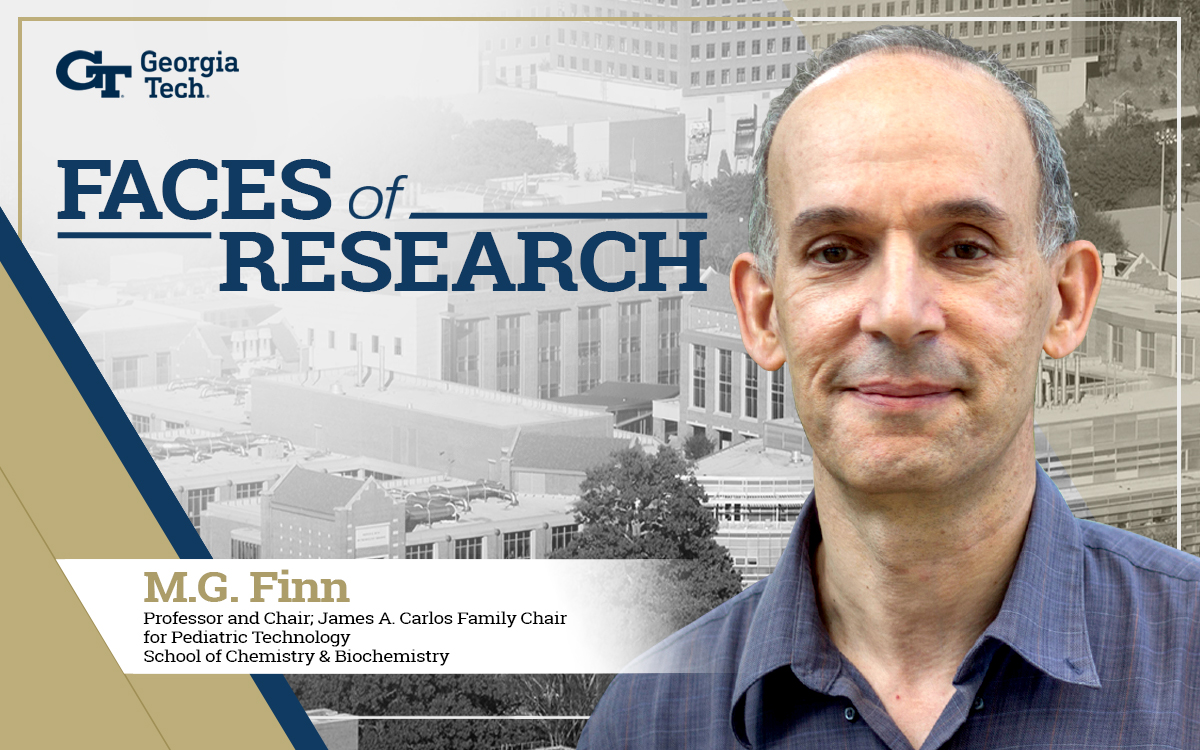Georgia Tech's School of Chemistry & Biochemistry conducts premier education and research in the chemical and biochemical sciences, with emphasis on interfaces with questions and applications in biology, materials, energy and sustainability, health care, and engineering. Its vision is to nurture and sustain excellence in research, education, training, and innovation.
This installment of the Faces of Research Q&A series is with M.G. Finn, who chairs the School of Chemistry & Biochemistry.
What is your field of expertise and why did you choose it?
We start with the development of reliable bond-forming chemical reactions - click chemistry - and with the practice of physical organic chemistry, which is the study of how the structure of molecules determines their function. We then apply these skills to a wide variety of subjects, including immunology and vaccine development, drug delivery, molecular evolution, and the creation of functional materials and surfaces.
I fell in love with physical organic chemistry early in my career, and found that it gave me a good way to approach other fields as well. I get great satisfaction from doing useful things and enabling others to do so as well. In molecular terms, this instantly translates to an interest in polymers and materials – Nature's (and chemistry’s) most useful class of molecules. And this molecular engineering mindset has led me and my group to many different areas with wonderful collaborators. This is an approach that fits very well at Georgia Tech.
What makes Georgia Tech research institutes unique?
Two features combine to make for a powerful environment at Georgia Tech. The first is often recognized by us and by others outside of our campus — the high density of outstanding investigators in (almost) all important areas of science, engineering, and computing, who are motivated to cooperate to do valuable work. This attitude permeates the place, and is a great source of inspiration and effectiveness. The second needs more recognition and attention – the strong investment by the Institute in core facilities. The Interdisciplinary Research Institute system is unique in my experience, and is a tremendous force multiplier to large numbers of experimental and computational investigators on campus, and in our region.
Indeed, and I’m speaking to Georgia Tech administrators, philanthropic donors, our state’s political leaders, and our entrepreneurial community now: doubling or tripling the resources supporting our core facilities is the best continuing investment you could possibly make in path-breaking, company-creating, knowledge-generating, economy-boosting research. Georgia Tech could be known as the place where the best researchers go to get things done, and nothing gets things done in the highly complex research environment that is the modern world like having ready access to outstanding instrumentation, computation, and staff expertise. You want to attract and empower the best, brightest, and most diverse research community in the world? Make these capabilities available, and stand back.
What impact is your research having on the world?
Click chemistry, which I and my group were privileged to help create in the early 2000s, and which was just honored with the 2022 Nobel Prize in Chemistry, has already changed the world by making it possible for scientists from many different areas to create new functional molecules or molecular systems. We have helped researchers all over the globe use powerful tools for molecule-making by inventing and optimizing methods that everyone can employ.
We have also helped popularize the use of viruses — nature’s most common and stable biological nanoparticles — as practical building blocks for chemists and biochemists. We are working to combat parasites that sicken millions of people each year by developing novel vaccines, and we work closely with the CDC to provide them with sensitive and selective ways to detect different pathogens, including different strains of the virus that causes COVID.
We are all developing new methods of drug release to create materials that would allow medicines to be delivered in the body over long periods without patients having to make repeated visits to the doctor’s office or hospital. And we are working on new ways to purify water, to trap carbon dioxide, and to save large amounts of energy in the processing of petroleum.
I have also had the honor and pleasure of co-leading the Georgia Tech Children’s Healthcare of Atlanta Pediatric Technology Center, an organization that promotes research with clinical partners at Children’s, Emory’s Department of Pediatrics, and other pediatric hospitals. This is a unique organization in the nation, deriving from the need for technological advances in pediatric healthcare and from the characteristic Atlanta-area spirit of collaboration.
What is something you wished you knew as a budding researcher that everyone considering research as a career should know?
Contrary to the popular image of scientists and engineers as socially isolated automatons, research is the most human and the most emotional of endeavors. You can’t get anywhere in our business alone, so the earlier you learn how to ask, share, and collaborate, the more successful you’ll be. Also, research is hard, so it’s bound to not go so well occasionally (or often). This can be emotionally devastating, unless you’re prepared by having a multidimensional life and by figuring out how to work through those emotional low spots. Sounds a lot like real life, right? Well, it is.
If you weren't a researcher, what would you be?
I’d run a restaurant and jazz club. In addition to science, I love food and music, so that’s an easy one.
Favorite show/program to binge watch?
That’s also easy – The West Wing. I’m a politics person – and, hey students, we need more scientists to be politicians!
For More Information Contact
Peralte C. Paul
peralte.paul@comm.gatech.edu
404.316.1210



